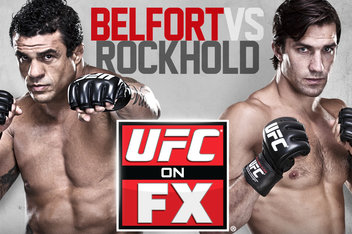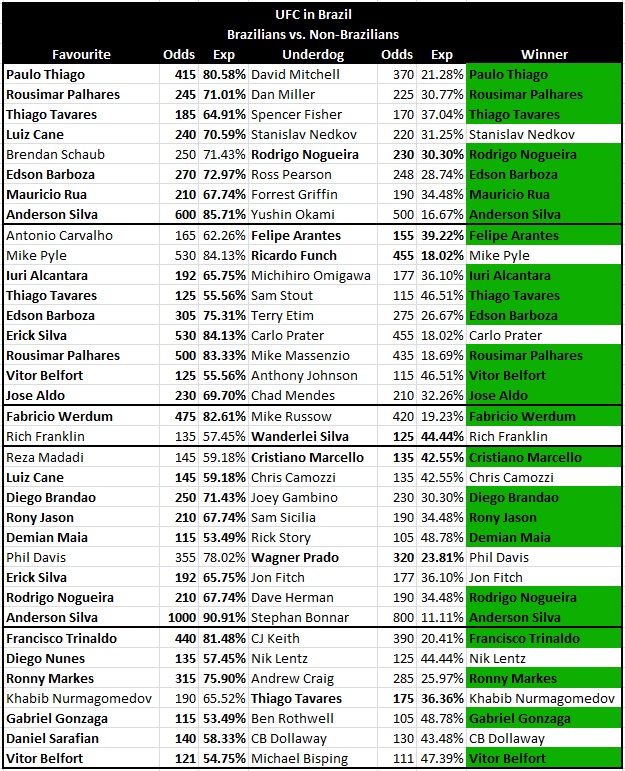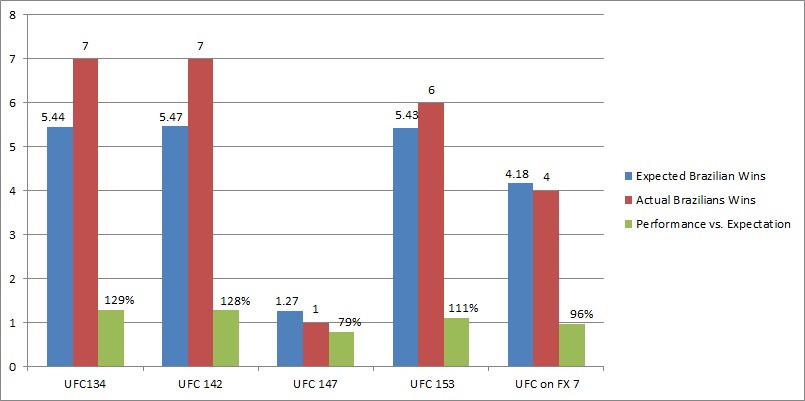 The UFC is headed back to Brazil for the sixth time in the Zuffa Era, as UFC on FX 8 takes place on May 19th from Jaragua do Sol. When it comes to the recent Brazilian cards, everyone remembers some of the amazing moments which really helped crystalize the organization’s foothold in the ever expanding market. Who could forget the absolute eruption when Antonio Rodrigo Nogueira knocked out Brendan Schaub at UFC 134? How about Jose Aldo’s impromptu trip into the crowd after his victory over Chad Mendes in the main event of UFC 142? These are the moments that stick in our minds, but the underlying theme to them was the absolute dominance of Brazilian fighters on those first couple trips back to their homeland. Brazilians went 14-3 against foreign fighters across those two cards, and set a precedent for the performance of their countrymen moving forward. With 10 Brazilians taking on foreign fighters at UFC on FX 8, the question is: Have Brazilians continued this string of dominance when fighting on home soil? If so, should we expect that to continue at UFC on FX 8? If not, is there a reason for it? Let’s take a look at the numbers to see. Across the five previous Brazilian cards, there have been a total of 35 fights involving a Brazilian against a non-Brazilian. The record of Brazilians in those bouts is 25-10, which is an impressive 71.4% winning percentage. However, upon further inspection, Brazilians were favored in 28 of those fights (80%). Of course, being a favorite in a fight doesn’t mean you’re expected to win all the time, nor does being an underdog guarantee a loss. In each case, the odds are merely a reflection of how often a fighter is expected to win. Taking this into account, the numbers transform a little bit. Using the closing odds of those 35 fights from Several Bookmakers, Brazilians were expected to win 21.78 of the 35 fights, meaning that the 25 actual wins exceeds the market’s expectations of Brazilians by about 15%. The chart below illustrates the closing odds and winner of all 35 bouts that fit the criteria.
The UFC is headed back to Brazil for the sixth time in the Zuffa Era, as UFC on FX 8 takes place on May 19th from Jaragua do Sol. When it comes to the recent Brazilian cards, everyone remembers some of the amazing moments which really helped crystalize the organization’s foothold in the ever expanding market. Who could forget the absolute eruption when Antonio Rodrigo Nogueira knocked out Brendan Schaub at UFC 134? How about Jose Aldo’s impromptu trip into the crowd after his victory over Chad Mendes in the main event of UFC 142? These are the moments that stick in our minds, but the underlying theme to them was the absolute dominance of Brazilian fighters on those first couple trips back to their homeland. Brazilians went 14-3 against foreign fighters across those two cards, and set a precedent for the performance of their countrymen moving forward. With 10 Brazilians taking on foreign fighters at UFC on FX 8, the question is: Have Brazilians continued this string of dominance when fighting on home soil? If so, should we expect that to continue at UFC on FX 8? If not, is there a reason for it? Let’s take a look at the numbers to see. Across the five previous Brazilian cards, there have been a total of 35 fights involving a Brazilian against a non-Brazilian. The record of Brazilians in those bouts is 25-10, which is an impressive 71.4% winning percentage. However, upon further inspection, Brazilians were favored in 28 of those fights (80%). Of course, being a favorite in a fight doesn’t mean you’re expected to win all the time, nor does being an underdog guarantee a loss. In each case, the odds are merely a reflection of how often a fighter is expected to win. Taking this into account, the numbers transform a little bit. Using the closing odds of those 35 fights from Several Bookmakers, Brazilians were expected to win 21.78 of the 35 fights, meaning that the 25 actual wins exceeds the market’s expectations of Brazilians by about 15%. The chart below illustrates the closing odds and winner of all 35 bouts that fit the criteria.
One issue that often arises when talking about any foreign cards is potential favoritism in judging towards hometown fighters. Whether the card takes place in Canada, the UK, or Brazil, “home cooking” always seems to be an issue, so let’s examine the methods by which these fights have been decided. Of the 25 Brazilian wins in these bouts, 16 have come by stoppage (10 T/KOs and 6 Submissions) and 9 have come by decision (7 unanimous, 2 split). Conversely, 4 of the 10 wins by non-Brazilians have come by stoppage (3 T/KOs, 1 Submission) and 5 have come by decision (4 unanimous, 1 split). The remaining “victory” for a non-Brazilian was the very controversial disqualification in the Carlo Prater/Erick Silva fight. Further examination of the 14 decisions over this sample really shows only three contentious decisions. These were in the Edson Barboza/Ross Pearson, Cristiano Marcello/Reza Madadi, and CB Dolloway/Daniel Sarafian fights. Two of these decisions went the way of the Brazilian fighter, but the only fight most onlookers agree went the wrong way was in the Marcello/Madadi bout. It should be noted that this particular fight was judged by two New Jersey based officials, and Aaron Chatfield, a UK-based judge who many consider to be one of the poorest in the sport at the present time – especially after his recent performance at the UFC on Fuel 7 event. It’s hard to point to any sort of bias in the judging of Brazilian events when only one fight in 35 has been judged incorrectly, and the outlying scorecard in that bout was turned in by a judge of Chatfield’s quality. With the track record we’ve seen in Brazil as far as judging goes – not to mention the fact that the judges are appointed from various other locales by UFC officials – it seems that the dreaded hometown decision shouldn’t rank highly among concerns for bettors when searching for opportunities on Brazilian events. Moving back to the overall results, an interesting note to the success of Brazilians is that through the first two cards (UFC 134 and UFC 142) where they went 14-3, they were only expected to win 10.91 matches. The total overperformance from Brazilians across all events held in their country (3.22 fights) is roughly the same as the overperformance from those first two cards alone (3.09 fights). Since that time, Brazilian fighters have been expected to win 10.88 fights, and have actually won 11, so they have essentially met the market’s expectations. The figure below shows the expected and actual performance of Brazilian fighters across all five cards that have taken place in the country.
Excluding UFC 147 because of its tiny sample size, the performance of Brazilian fighters has declined in comparison with their expectation in each of the organization’s return trips to the country. The worst performance by Brazilian fighters also occurred on the most recent card, which was the first FX card booked in the country. It seems that one of three things has occurred when it comes to Brazilian cards:
- UFC 134 and 142 were designed to result in Brazilian success as a means of breaking in to the market, and now that the UFC has established a foothold in Brazil the matchmaking is less biased towards the hometown fighters.
- The performances of the fighters on those first two Brazilian cards caused the public to overvalue Brazilian fighters.
- With the UFC shifting to a more global approach on their free TV cards, the quality of Brazilian fighters being booked on FX and Fuel cards is inferior to the quality of the fighters who were being booked on the PPV cards. As a result, the rate at which they have been picking up losses has increased.
Personally, I feel that a combination of all three factors has resulted in the downward trend of Brazilian fighters. Given that the upcoming event is another FX card – which, by nature, is booked differently than a PPV card – I expect the trend to continue. Obviously the betting odds on the fights and line movement will truly illustrate the expectations of Brazilian fighters on this next card, but a preliminary look at the card leads me to believe that Brazilian fighters could be favored in as many as 9 of the 10 fights fitting this model (potentially every fight except for the main event, which is currently nearly a pick em). I certainly don’t expect that many Brazilians to claim victory on the card, as they will be involved in some tough matchups, particularly on the undercard. Still, only time will tell if Brazilian fighters can reclaim the form that made them so dominant in the UFC’s first couple of forays to the country in the modern era.

